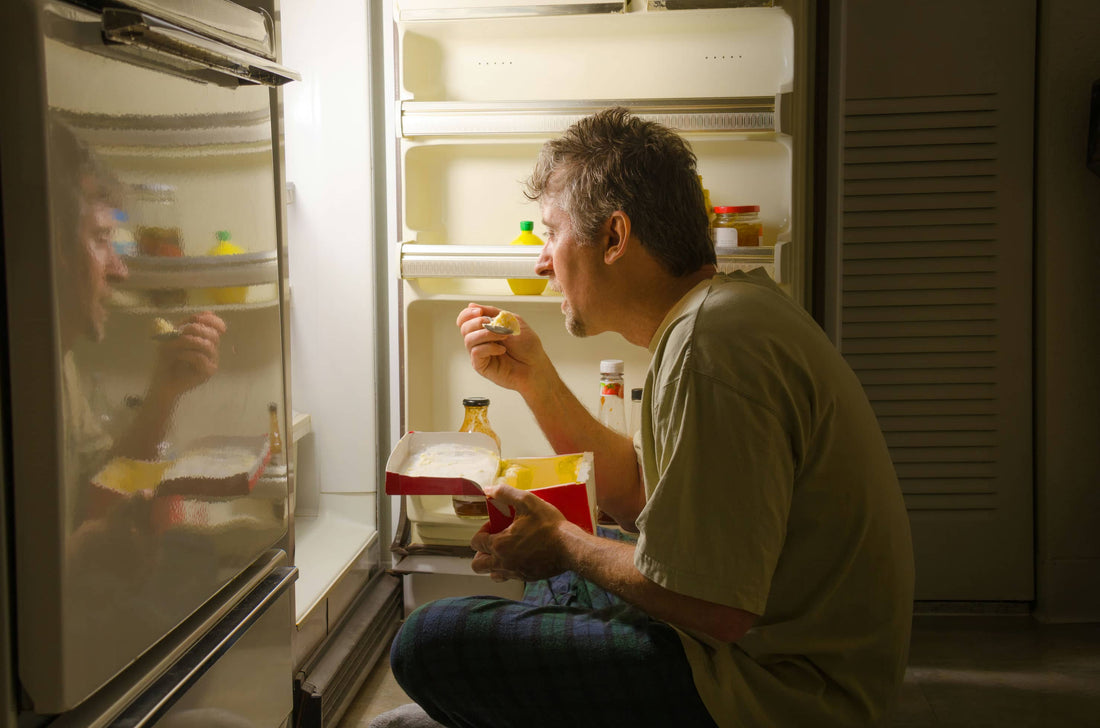
The Strange (and Sometimes Scary) Truth About Sleep Eating
Share
You may think that avoiding the call of late night snacking is difficult, but imagine how much harder it is for the people that are doing it in their sleep?
Yep, sleep eating is a real thing.
Also known as sleep-related eating disorder (SRED), this phenomenon occurs when people walk into the kitchen, prepare food, and eat it – all while sleeping. And they don’t remember a thing!
Each SRED episode lasts around 10 minutes, and happens at least once per sleep cycle. As strange (and even funny) as it sounds, sleep eating shouldn’t be taken lightly. Most sleep eaters tend to go for food that is high in fat, sugar, and calories.
Some even eat non-food items, such as cleaning products or medication, and it can be very difficult to wake a sleep eater. Yikes! This means that sleep eating poses a serious risk to the health of those that are affected by it.
Health Concerns
SRED interrupts healthy sleep patterns, and can lead to full-blown insomnia in some sleep eaters. Insomnia is a serious health concern, as it can lead to diabetes, elevated blood pressure, heart disease, and even depression.
There is also the possibility of a sleep eater injuring themselves during an episode by tripping and falling, or even burning themselves on a hot surface while trying to prepare food in their sleep. And of course, there is the worry that sleep eaters might mistakenly ingest something that isn’t food, and might even be toxic.
Causes of SRED
Although there is no known true cause of SRED, doctors and scientists have found some risk factors, including hepatitis, an overabundance of dieting, and serious bouts of stress.
Some other sleep-related disorders have also been shown to bring on SRED, such as narcolepsy, restless legs syndrome, sleep apnea, and an irregular sleep-wake rhythm.
It’s also been shown that some prescription medications may cause SRED, especially those used to treat depression and insomnia.
Who’s at Risk?
Sleep experts have estimated that around 1.5% of people eat while they sleep, and that more women than men are sleep eaters. There has also been studies that show those with another eating disorder, such as anorexia or bulimia, are more likely to be found sleep eating.
How to Help a Sleep Eater
Doctors have been unable to find a cure for SRED, but they have found ways to effectively treat the disorder.
Sleep eaters may be prescribed medications with dopamine in them, as a boost of dopamine in the system has been shown to help eliminate sleep eating.
Making sure that those that have been known to sleep eat have a nutritious diet can also help, since SRED has been linked to people that don’t eat enough during their waking hours for extended periods of time.
Getting enough sleep is also very important in preventing sleep eating. Setting a strict sleep schedule has been shown to ward off SRED.
Doctors also recommend taking part in talk therapy in an effort to alleviate stress – another known cause of SRED.
If you or any of your loved ones have experienced sleep eating, you should consult a doctor immediately. In the meantime, be sure to keep all paths to the kitchen clear to prevent falling, and lock up all possibly toxic items, such as household cleaners and medications.
